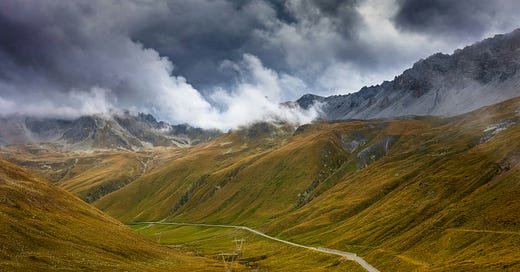Ecocriticism and the Environmental Humanities originated in the Anglo-Saxon academic sphere, particularly in the United States. I outlined some very brief historical notes on this in the first post on Letteraterra:
I am not a native English speaker; I live and write in Italy, and I thought it might be interesting to offer a brief overview of the state of the field in my country.
In this regard, it is useful to highlight the work of Annamaria Elia, "Letteratura ed Environmental Humanities: un quadro teorico". Status Quaestionis, which does this and extends its scope to Europe as well. She points out some interesting works.
In Italy, thought and studies that can be classified under this label emerged in the 1970s with the work of Enrico Tiezzi, a chemist who,
in Tempi storici, tempi biologici (1989), advocated for the emergence of a new ecological knowledge that would serve as a "bridge between scientific culture and humanistic culture." (Elia 2024)
From an epistemological and humanistic perspective, Elia suggest also a closer look to the work of Joseph W. Meeker that in Germany posed a similar question: Can literature save us from extinction? In The Comedy of Survival: Studies in Literary Ecology (1974), he identified Comedy as the path to salvation rather than the often overused register of Tragedy.
Returning to Italy, Elia points to the work of Armando Gnisci in Baglioni, Andrea, and Armando Gnisci. Lettere & Ecologia. Carucci, 1990. In this work,
Gnisci identified the intersection of literature and ecology as a tool for "the indication and construction of an epochal, radical, and worldly ecological consciousness that we must all contribute to building and spreading: scientists and citizens, educators and students, parents and philosophers, writers and politicians" (Gnisci 1990, 12) [in Elia, 2024].
Today, among the most prominent Environmental Humanities Italian scholars we can include Serenella Iovino and Marco Armiero. Although both are Italian, they conduct extensive research in an international context.
Serenella Iovino is a Full Professor at the University of North Carolina at Chapel Hill, where she inaugurated the first joint chair in Italian Studies and Environmental Humanities.
Marco Armiero is the Director of the Environmental Humanities Laboratory at the Royal Institute of Technology, Sweden, and a Senior Researcher at the Institute for the Study of Mediterranean Societies, Italian National Research Council, Naples, Italy. His research focuses more on the sociological aspects of the humanities than on the literary ones
Elia also highlights the Cantiere umanistico dell’Antropocene, coordinated by Carla Benedetti and Cristina Savettieri at the University of Pisa.
In the coming weeks, we will further explore the work of some of these scholars to trace the development of ecocriticism in Italy. Additionally, we will attempt to outline the contributions of some of the "founding figures" of Italian literature who have profoundly engaged with the relationship between humans and nature, advocating for its reinterpretation in terms of greater balance and sustainability: Leopardi, Calvino, Zanzotto, Pasolini, Rigoni Stern, Ceronetti, Levi, and Moresco.
Here is a bibliography on Italian ecocriticism, keeping the original titles of the works while providing an English description.

Essential Bibliography on Ecocriticism in Italy
Historical and Theoretical Foundations
Tiezzi, Enrico. Tempi storici, tempi biologici. Feltrinelli, 1984.
A pioneering work exploring the relationship between natural sciences and the humanities.
Gnisci, Armando, and Andrea Baglioni. Lettere & Ecologia. Carucci, 1990.
One of the earliest Italian studies on the intersection of literature and ecology.
Ecocriticism and Environmental Humanities
Iovino, Serenella. Ecologia letteraria. Una strategia di sopravvivenza. Edizioni Ambiente, 2006.
One of the first systematic studies of ecocriticism in Italy.
Iovino, Serenella. Ecocriticism and Italy: Ecology, Resistance, and Liberation. Bloomsbury, 2016.
Analyzes ecocriticism in Italy from an international perspective.
Armiero, Marco. A Rugged Nation: Mountains and the Making of Modern Italy. White Horse Press, 2011.
An eco-historical analysis of the role of mountains in Italian national identity.
Armiero, Marco, and Massimo De Angelis (eds.). Le comunità dell'energia. Per una storia sociale dell’energia in Italia. Edizioni Odradek, 2018.
Explores the relationship between energy, environment, and society through an eco-historical lens.
The Anthropocene and Political Ecology
Benedetti, Carla, and Serenella Iovino (eds.). Testimoniare il cambiamento. La crisi climatica narrata dai media e dalla letteratura. ETS, 2021.
An investigation into how climate change is narrated in literature and the media.
Cavalli, Luciano, and Enrico Tiezzi. L'Universo come progetto. Donzelli, 1996.
A dialogue between science and ecology proposing a new model of knowledge.
Latini, Daniela, and Serenella Iovino (eds.). Antropocene e letteratura. Narrazioni ecologiche del mondo contemporaneo. Carocci, 2022.
Explores the role of literature in representing the Anthropocene.
Ecocriticism and Italian Literature
Benedetti, Carla. Disumane lettere. Indagini sulla cultura della nostra epoca. Laterza, 2011.
A study on nature representations in contemporary literature.
Zangrandi, Silvia. Paesaggi in transizione: ecocritica e letteratura italiana del Novecento. Mimesis, 2018.
Examines the relationship between environment and 20th-century Italian literature.
Elia, Annamaria. Letteratura ed Environmental Humanities: un quadro teorico. Status Quaestionis, 2024.
An overview of ecocriticism in Italy and Europe.
This bibliography provides a solid foundation for exploring ecocriticism in Italy, covering theoretical, historical, and literary aspects.



